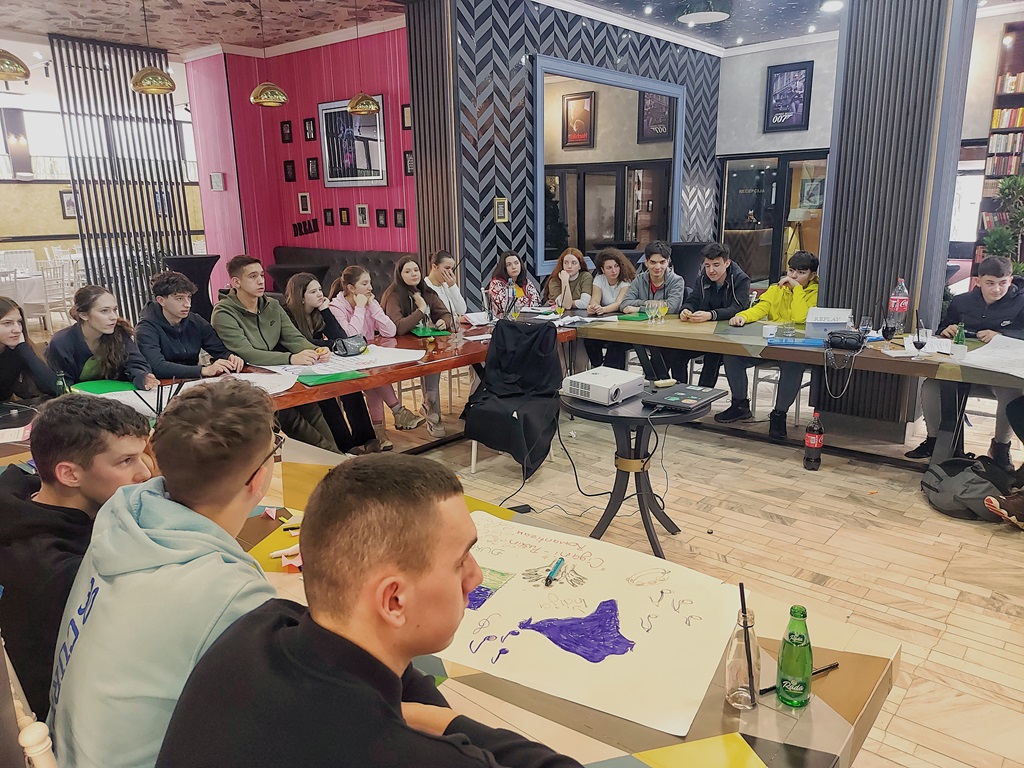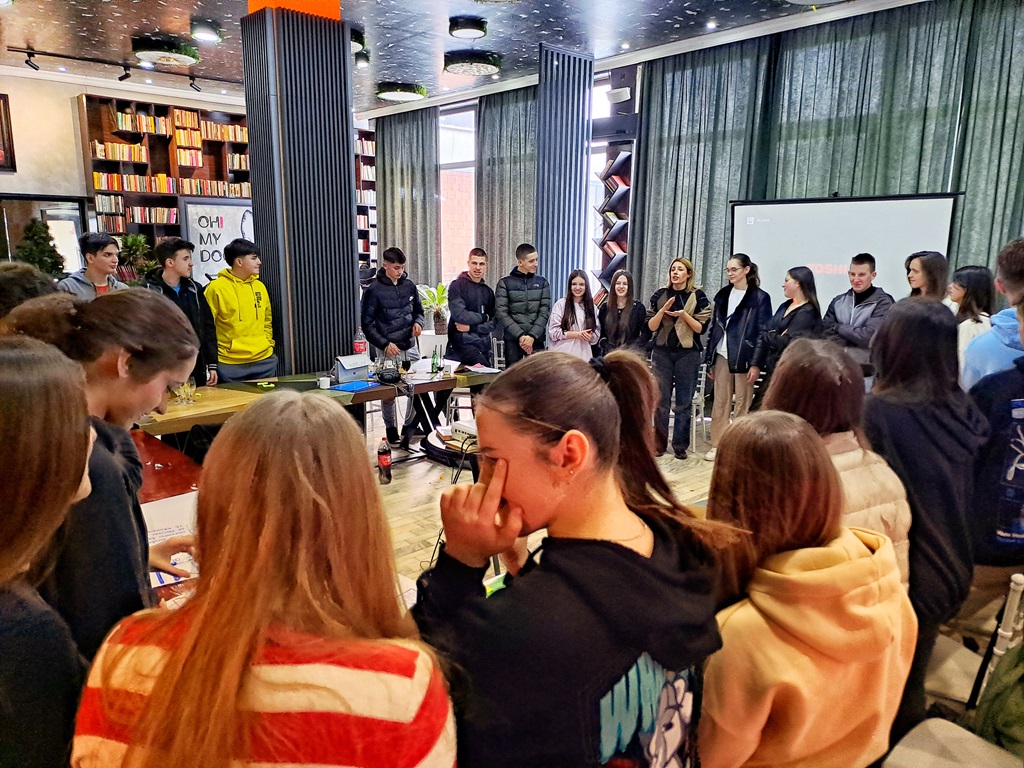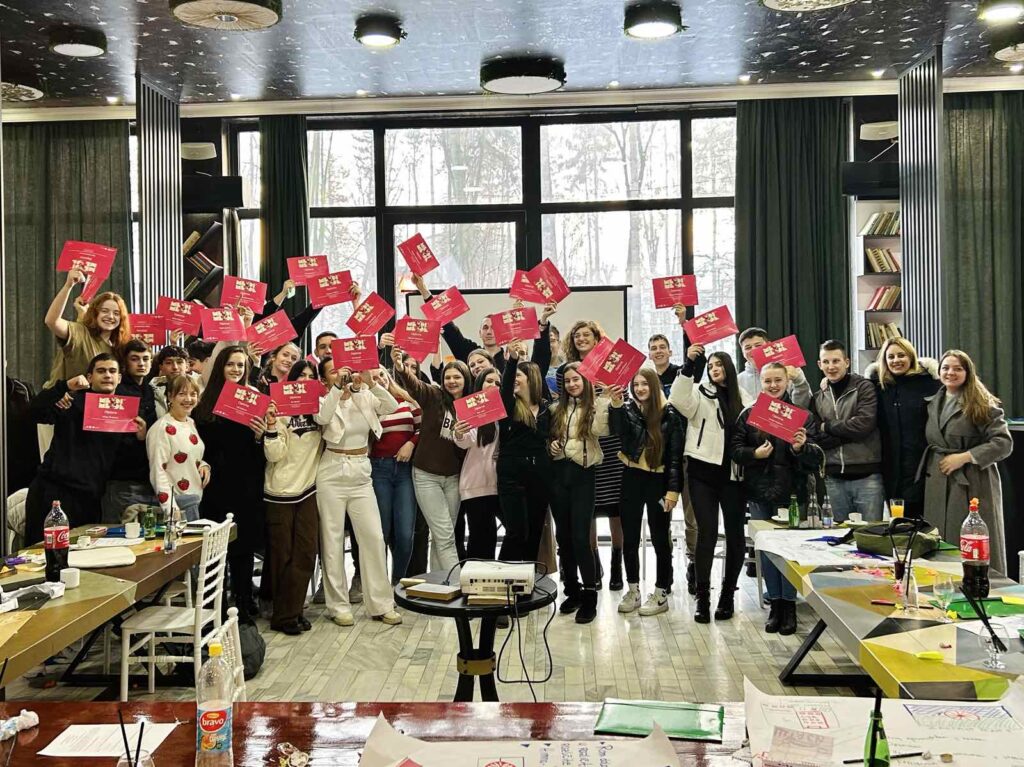Informal education inspires and provides knowledge to young people for initiating positive changes in their schools and environment, but also significantly contributes to empowering them for active participation in society, as it was concluded at Youth Activism School for high school students from the northern region of Montenegro, organized by Centre for Civic Education (CCE) with the support of the United States Embassy in Podgorica through the Democracy Commission Small Grants Program.
Through an intensive and interactive two-day long programme held in Bijelo Polje on 25 and 26 January, young participants learned about the concept of youth activism, human rights and their protection, rhetoric skills, empowerment of marginalized and vulnerable communities, as well as creating and advocating for youth initiatives. The training involved short introductory lectures, workshops, group work, film screenings, simulations, and open discussions.
The goal of the Youth Activism School is to build the capacities of young people to position themselves as active citizens who contribute to social changes and the promotion of human rights in Montenegro.
“The future of our country lies in the hands of the youth, and therefore, informal education, such as this Youth Activism School, has a significant impact. The influence of CCE is crucial for us, the youth, as it provides a more engaging education system,” said Bojana Marinković, a pupil at PI SVS “Vukadin Vukadinović” in Berane.
“Two days of socializing, learning, and gaining new knowledge have left a beautiful impression on me, a sense of usefully spent time. I believe that students from other schools and cities should apply for future programmes like this,” stated Milić Sinđić, a pupil at the Secondary Vocational School in Bijelo Polje.
“It is important to be part of the activism that we support, in which we feel inspired and motivated, because it is also a way to improve our school, environment and society. Participating in this school connected me with peers who share the same goals, but also improved my knowledge about tools for initiating change”, says Novka Marinković, a pupil of PI SVS “Vukadin Vukadinović” in Berane.
“Young people should not leave their country because there is potential for mutual development in it. On the other hand, the state should provide economic opportunities, support, and value the talents among young people so that they can fulfil their dreams within their own borders,” emphasized Tijana Bukilić, a pupil at SMS “Braća Selić” in Kolašin.
Enes Pućurica, youth activist and Young European Ambassador, emphasized that youth activism plays a crucial role in shaping our society. ‘Young people bring fresh perspectives, energy and innovative ideas that are significant for addressing social issues. Through this engagement, we acquire leadership, organizational and communication skills, but also gain an active role in our society. Young people are ready, however, insufficient information, institutions and schools that do not provide adequate space for this kind of development are part of the problems that young people encounter. This prevents us from becoming even more active and making an appropriate contribution to our community. With this type of education, generations ready to fight for what belongs to them and represent active part of this society will be created,’ stated Pućurica, one of the trainers at the Youth Activism School.
Jelena Fuštić, from Union of young entrepreneurs of Montenegro and workshop facilitator, believes that through such forms of education, young people acquire the necessary skills of communication, problem analysis, and taking initiatives for positive community changes. ‘Youth activism is not just an expression of personal beliefs but also a crucial element of a democratic society. By encouraging young people to get involved, we build a community that values diversity of opinion and fosters constructive dialogue. Their energy and enthusiasm often lead to innovative solutions that Montenegrin society needs,’ Fuštić assessed.
Martina Labović, a participant in the protests against hydropower plant in Bare Kraljske, inspired participants of the school to join activities for environmental protection. ‘I believe that gatherings of this kind are one of the right ways for young people to educate themselves. The environmental protection can be a driving force and motivation for young individuals to fight for the preservation of biodiversity and the environment. Therefore, this type of interaction can stimulate young people to think and develop awareness about existing problems, to be creative in solving them but also to motivate them to initiate various activities themselves. Additionally, young people can share acquired knowledge about current issues with their peers,’ she said.
Lecturers and workshop facilitators at the Youth Activism School were experts in the fields of human rights and activism. Participants were young individuals of different ages from seven high schools and five municipalities in the northern region of Montenegro – Kolašin, Plav, Andrijevica, Berane, and Bijelo Polje.
The Youth Activism School was successfully completed by 37 high school students: Tijana Bukilić, Katarina Rakočević, Mileva Knežević, Adela Stanić, Anita Zoronjić, Katarina Milićević, Ines Džogović, Mia Raičević, Aleksa Zejak , Ida Crnovršanin, Adisa Bošnjak, Helena Fatić, Enida Kasumović, Erna Karalić, Radojka Rajković, Bogdan Maslovarić, Vasilije Đurković, Aleksandar Aleksić, Boško Rakočević, Aleksandar Obradović, Kristina Radović, Hana Balić, Ognjen Sošić, Zijad Spahić, Kaća Jelić, Oleg Živković, Aldina Mustafić, Hana Ramović, Novka Marinković, Milić Sinđić, Bojana Marinković, Milena Babović, Ena Bučan, Amil Koborović, Vujadin Đukić, Bogdan Veličković and Kerim Karalić.
Maja Marinović, Programme associate



